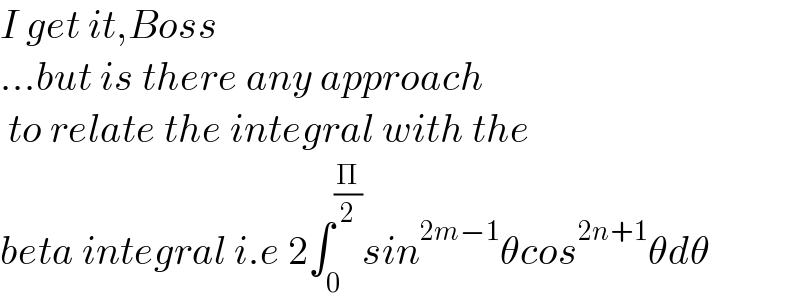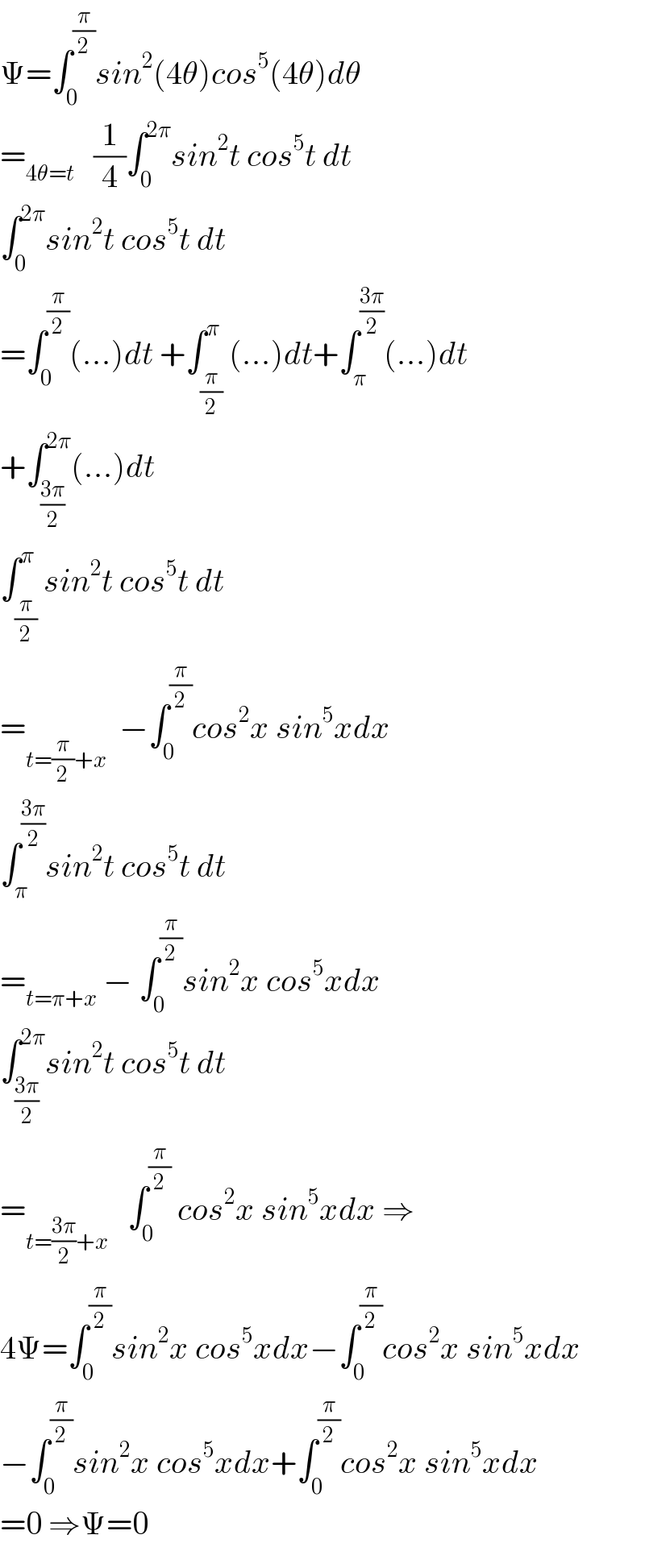
Question and Answers Forum
Question Number 175247 by rexford last updated on 24/Aug/22

Answered by Ar Brandon last updated on 24/Aug/22
![I=∫_0 ^(π/2) sin^2 4ϑcos^5 4ϑdϑ =∫_0 ^(π/2) sin^2 4ϑ(1−sin^2 4ϑ)^2 cos4ϑdϑ =∫_0 ^(π/2) (sin^2 4ϑ−2sin^4 4ϑ+sin^6 4ϑ)cos4ϑdϑ =(1/4)[((sin^3 4ϑ)/3)−((2sin^5 4ϑ)/5)+((sin^7 4ϑ)/7)]_0 ^(π/2) =0](Q175249.png)
Commented by rexford last updated on 25/Aug/22

Commented by Ar Brandon last updated on 25/Aug/22

Commented by rexford last updated on 25/Aug/22

Commented by Ar Brandon last updated on 25/Aug/22
![What your calculator gives you is probably the sum of areas bounded by f(x) and the x-axis which is [((sin^3 4ϑ)/3)−((2sin^5 4ϑ)/5)+((sin^7 4ϑ)/7)]_0 ^(π/8) =(1/3)−(1/5)+(1/7)=((29)/(105)) square units](Q175259.png)
Commented by Ar Brandon last updated on 25/Aug/22

Commented by rexford last updated on 25/Aug/22

Commented by Ar Brandon last updated on 25/Aug/22
![Yah sure ! I=∫_0 ^(π/2) sin^2 4ϑcos^5 4ϑdϑ=(1/4)∫_0 ^(2π) sin^2 tcos^5 tdt 4I=∫_0 ^(π/2) sin^2 tcos^5 tdt_(A) +∫_(π/2) ^π sin^2 tcos^5 tdt_(B) +∫_π ^((3π)/2) sin^2 tcos^5 tdt_(C) +∫_((3π)/2) ^(2π) sin^2 tcos^5 tdt_(D) For B let t=π−u ⇒B=∫_0 ^(π/2) sin^2 (π−u)cos^5 (π−u)du ⇒B=−∫_0 ^(π/2) sin^2 ucos^5 udu=−A since sin(π−u)=sinu, cos(π−u)=−cosu Similarly for C we let t=((3π)/2)−u and we have −∫_0 ^(π/2) cos^2 usin^5 udu, since sin(((3π)/2)−u)=−cosu and cos(((3π)/2)−u)=−sinu which is equal to −∫_0 ^(π/2) sin^2 ucos^5 udu since ∫_0 ^(π/2) sin^m ucos^n udu=∫_0 ^(π/2) cos^m usin^n udu And for D when we let t=2π−t we have ∫_0 ^(π/2) sin^2 ucos^5 udu So I=∫_0 ^(π/2) sin^2 tcos^5 tdt−∫_0 ^(π/2) sin^2 ucos^5 udu−∫_0 ^(π/2) sin^2 ucos^5 udu+∫_0 ^(π/2) sin^2 ucos^5 udu Now you can apply your beta function since we now have the usual limits [0, (π/2)]. Although that will be superfluous since we can already notice all the partial integrals cancel out themselves A−A−A+A=0](Q175274.png)
Answered by Mathspace last updated on 25/Aug/22

